[Editor’s Note: Mad Scientist Laboratory is pleased to publish today’s post by returning guest blogger and proclaimed Mad Scientist Marie Murphy, exploring the evolving role of nation-states in an increasingly multipolar world. While nations-states will persevere as the primary actors in the international system for the foreseeable future, their dominion will increasingly be challenged by the growing wealth and influence of multi-national corporations (MNCs) and the emergence of on-line communities of interest coalescing beyond traditional concepts of nationality and fidelity. Given the resultant diffusion of power and allegiance, the dynamics of competition and conflict may well morph beyond our current concepts of allies, strategic competitors, and large scale combat operations. Ms. Murphy posits two scenarios and then explores the associated ramifications of this evolving power dynamic for the U.S. Army — Enjoy!]
It’s a human fallacy to believe that things in the present have always been and always will be.1 Of course, history books confirm that this is not the case, but it is difficult to imagine living in a world other than the one we’ve adjusted to today. 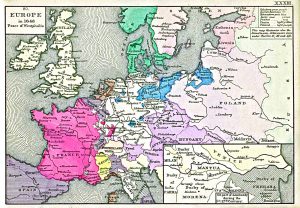 We are all familiar with the current structure of international power, but nation-states as we know them are a relatively new concept. The “official” creation date for what is considered the modern nation-state is often pinned at the Peace of Westphalia in 1648.2 However, it wasn’t until the end of WWII and the subsequent redefining of territory in Africa and the Middle East that the modern map began to appear. The fall of the USSR in 1991 redrew the map again, adding new states in Eastern Europe, the
We are all familiar with the current structure of international power, but nation-states as we know them are a relatively new concept. The “official” creation date for what is considered the modern nation-state is often pinned at the Peace of Westphalia in 1648.2 However, it wasn’t until the end of WWII and the subsequent redefining of territory in Africa and the Middle East that the modern map began to appear. The fall of the USSR in 1991 redrew the map again, adding new states in Eastern Europe, the 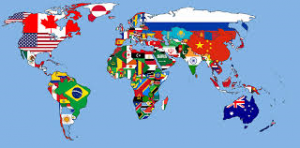 Caucasus, and Central Asia. These major shifts occurred within the lifetimes of people today, demonstrating that the current world order is anything but set in stone.
Caucasus, and Central Asia. These major shifts occurred within the lifetimes of people today, demonstrating that the current world order is anything but set in stone.
There are several emerging factors which may come to threaten the recent primacy of the nation-state in the distribution of global power as it currently stands, including the resurgence of multi-national corporations (MNCs) and the proliferation of online organizations, both aided by the technological advances of the 21st century. MNCs and online organizations connect people around the world and transcend national boundaries. They are capable of amassing capital and influence comparable to that of some nation-states, creating a potential shift in global power dynamics. For example, in 2018, Amazon topped $1 Trillion in value, placing it 17th in the world amongst nation-states in terms of GDP.3
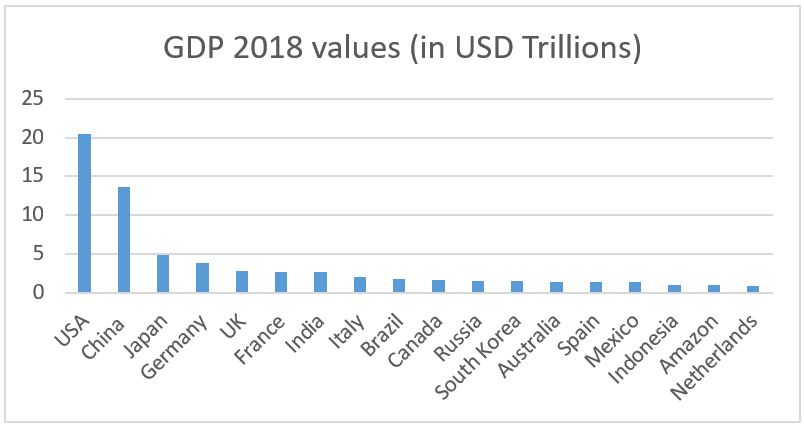
Today, MNCs such as Apple and Amazon rely on global stability to maintain optimal operations. Conflicts affect companies by threatening the interruption or loss of crucial supply chains and the diversion of workers. Due to these potential disruptions, MNCs may have an interest in discouraging, reducing, and restricting conflict and some have the capital to attempt to do so. On the other hand, not all corporate intervention in conflict spaces could prove benevolent. Companies could partner with competing parties in a conflict or further exacerbate divisions by involving their own private security forces. The consequences of kinetic intervention by MNCs may prove detrimental, especially if it disrupts the production and distribution of critical natural resources or the economic livelihoods of the local population that depend on its peaceful presence.4 As the global influence of MNCs rises, the U.S. Army may face questions such as: Could conflict that poses a potential disruption to private industry be mitigated by that industry? Could industry be a major player in conflict zones?
The potential rise of individual allegiances and ideologies beginning to align more with virtual communities, which do not recognize international borders, may start to erode the cultural and political bonds of a nation-state. One example of a diverse online community is Facebook, which currently stands as a platform for like-minded people to join groups and pages according to their personal interests.
 But could this be taken to the next level? Facebook recently announced the potential launch of its own digital currency. While many consider this technology to be ahead of its time, and definitely ahead of regulatory standards, it may be a signal that online entities will be capable of encroaching upon what has historically been a governmental responsibility.5 As online organizations develop and proliferate, questions pertinent to national defense begin to emerge, including: Could a nation suffering from ideological dissolution still field a physical army? Could an online organization with multinational membership present a cyber threat to armed forces around the world? Could an online community create its own army not based on geography and borders, but on shared belief?
But could this be taken to the next level? Facebook recently announced the potential launch of its own digital currency. While many consider this technology to be ahead of its time, and definitely ahead of regulatory standards, it may be a signal that online entities will be capable of encroaching upon what has historically been a governmental responsibility.5 As online organizations develop and proliferate, questions pertinent to national defense begin to emerge, including: Could a nation suffering from ideological dissolution still field a physical army? Could an online organization with multinational membership present a cyber threat to armed forces around the world? Could an online community create its own army not based on geography and borders, but on shared belief?
So, where do these current and potential developments leave nation-states? I have chosen to highlight two possible future scenarios which may emerge from the rising influence of MNCs and online organizations: a multipolar power distribution and a devolving status quo.
The world may be evolving into a multipolar system comprised of different nodes of power; where nation-states, MNCs, and online organizations operate on a more even global playing field. MNCs may begin to leverage their high levels of capital, resources, and influence to impact international and military affairs 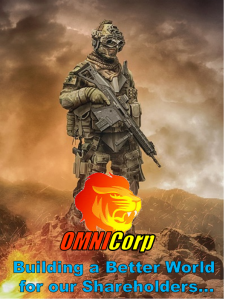 beyond the oversight of a government. A company’s entrenchment in a region or domain where conflict is developing may be sufficient grounds for direct involvement. If the company exerts more power than the government in that area, it may take on the roles and responsibilities of either mitigating or managing that conflict, possibly including the use of private forces or the co-opting of the legitimate military. Large and diverse online organizations begin to fray the social fabric of established nation-states as citizens’ lives increasingly move and are lived online. These organizations may develop the social organizational capacity that governments used to exclusively possess; the ability to coordinate the mass movement or participation of a large number of people or to control society in other ways, such as holding and managing their currency. In this scenario, nation-states play a somewhat diminished role as what used to be exclusively state-held power is now dispersed among various relevant international organizations.
beyond the oversight of a government. A company’s entrenchment in a region or domain where conflict is developing may be sufficient grounds for direct involvement. If the company exerts more power than the government in that area, it may take on the roles and responsibilities of either mitigating or managing that conflict, possibly including the use of private forces or the co-opting of the legitimate military. Large and diverse online organizations begin to fray the social fabric of established nation-states as citizens’ lives increasingly move and are lived online. These organizations may develop the social organizational capacity that governments used to exclusively possess; the ability to coordinate the mass movement or participation of a large number of people or to control society in other ways, such as holding and managing their currency. In this scenario, nation-states play a somewhat diminished role as what used to be exclusively state-held power is now dispersed among various relevant international organizations.
Alternatively, nation-states may continue to hold the majority of global power, but the massive capital and influence of MNCs and online organizations could grow to become at odds with governments and these groups may vie for a seat at the table. A devolved version of the present may manifest in the event of increased isolationism as large companies lobby their governments to do business worldwide while leaders prefer more domestically focused economic thinking.  Online organizations may overtake governments in cultural leadership, leaving governments to be little more than administrative units while citizens who live next door to each other have allegiances to groups and organizations formed from people from all over the world. These online groups may eventually take on governmental responsibilities as well (such as taxation used to provide services) and have the capability to incite mass mobility at a moment’s notice.
Online organizations may overtake governments in cultural leadership, leaving governments to be little more than administrative units while citizens who live next door to each other have allegiances to groups and organizations formed from people from all over the world. These online groups may eventually take on governmental responsibilities as well (such as taxation used to provide services) and have the capability to incite mass mobility at a moment’s notice.
Combatting these potential changes in the international balance of power poses new challenges for the Army. Either of these scenarios could alter ally/competitor relationships. Alliances might shift due to either economic interests or ideological priorities. Such considerations may supersede geostrategic factors in a historically symbiotic alliance. The need for American protection and military assistance might not be as great if current power competitors no longer hold that same power or demonstrate a shift in interests.
An evolving power dynamic would alter the way that the Army thinks about its concepts and structures its force. In the future, MNCs may be “another player on the field,” both domestically through lobbying and political influence and in theater due to their operations or investments on the ground. This entanglement of military objectives and private industry interests may demand greater consideration as corporations continue to drive economic development and 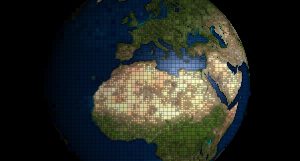 growth worldwide. Online organizations may divert critical human resources away from patriotic causes towards ones that fulfill specific personal ideologies which may not align with the Nation and the Army. Based on economic and technological advancements, the Army may find itself with different established allies and in the company of states and organizations whose interests and capabilities temporarily align with the U.S. The role of a nation-state in the global order may be evolving as other powerful players come to the table. Whether or not these players will be integrated, or are too big not to be, is yet to be seen.
growth worldwide. Online organizations may divert critical human resources away from patriotic causes towards ones that fulfill specific personal ideologies which may not align with the Nation and the Army. Based on economic and technological advancements, the Army may find itself with different established allies and in the company of states and organizations whose interests and capabilities temporarily align with the U.S. The role of a nation-state in the global order may be evolving as other powerful players come to the table. Whether or not these players will be integrated, or are too big not to be, is yet to be seen.
If you enjoyed this post, please see:
– Virtual Nations: An Emerging Supranational Cyber Trend, also by Marie Murphy
– Splinternets, by Howard Simkin
– Alternet: What Happens When the Internet is No Longer Trusted? by LtCol Jennifer “JJ” Snow
Proclaimed Mad Scientist Marie Murphy is a senior at The College of William and Mary in Virginia, studying International Relations and Arabic. She is a regular contributor to the Mad Scientist Laboratory, interned at Headquarters, U.S. Army Training and Doctrine Command (TRADOC) with the Mad Scientist Initiative during the summer of 2018, and is currently serving as a Mad Scientist Initiative consultant. She was a Research Fellow for William and Mary’s Project on International Peace and Security.
Disclaimer: The views expressed in this article do not imply endorsement by the U.S. Army Training and Doctrine Command, the Army Futures Command, the U.S. Army, the Department of Defense, or the U.S. Government. This piece is meant to be thought-provoking and does not reflect the current position of the U.S. Army.
1 Bartlett, Jamie. “Return of the City-State,” Aeon, September 5, 2017. https://aeon.co/essays/the-end-of-a-world-of-nation-states-may-be-upon-us
2 “Peace of Westphalia (1648),” Oxford University Press. https://www.oxfordbibliographies.com/view/document/obo-9780199743292/obo-9780199743292-0073.xml
3 “Gross Domestic Product 2018,” World Bank, 2018. https://databank.worldbank.org/data/download/GDP.pdf
Streitfield, David. “Amazon Hits $1,000,000,000,000 in Value, Following Apple,” The New York Times, Sept. 4, 2018. https://www.nytimes.com/2018/09/04/technology/amazon-stock-price-1-trillion-value.html
4 Humphreys, Macartan. “Economics and Violent Conflict,” Harvard University, 2003. https://www.unicef.org/socialpolicy/files/Economics_and_Violent_Conflict.pdf
5 Sprouse, William. “Facebook Says Libra Digital Currency May Never Launch,” CFO, July 30, 2019. https://www.cfo.com/regulation/2019/07/facebook-says-libra-digital-currency-may-never-launch/

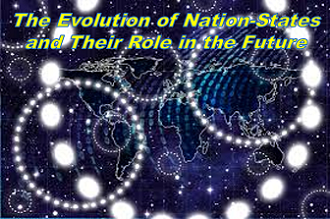


Interesting post and perhaps this young author has a better grasp on possible future challenges. But I have doubts regarding the ability of MNCs or online communities to undermine the traditional state. Man’s fundamental nature has not changed all that much over the past 5,000 years of recorded history. Just as our ancestors were moved to defend their “tribal” interests, so today, modern man is mostly driven to violence under similar slogans. Would an employee of Wal-Mart, Amazon, or Alibaba be willing to sacrifice his/her life for better 1st Quarter earnings? If and when this world slouches toward global chaos, men and women will likely slaughter each other over ethnic differences and not market share or virtual currencies.
Multinational corporations and comparable structures predate the modern and slightly paranoid context presented by the author and typically seek profit not national sovereignty. Trading caravans dating to the origin of the silk road 1.0, the earliest days of Nile commerce or more contemporarily the trade in natural resources across continents by industrialists in the 19th and 20th centuries all demonstrated a measure of economic power that ranges from spices and silk, coffee or tea into the raw materials and fuels of modern culture. Corporate and individual wealth has influence in politics and various cultural contexts and that is surely not new or novel. It’s also likely to persist based on history and human nature.
National sovereignty and governance with historical checks by multiple parties, the electorate, judicial action and the media (print or electronic) similarly has an influence and has evolved since the origin of the printed word. The author’s contention of future warfare having something new is something old. We find a new era of hybrid warfare and increasing free market national contention with centralized-power command economic structures that manipulate markets and media for expeditionary warfare and imperial expansion. Perhaps it is more important to consider the ancient tenets of Sun Tsu and the modern tenets of the DIME decision making model. The US Army has remade itself several times through its modern history. A new approach to expressions of coordinated diplomatic, information, military and economic power is in the interest of our sovereign nation, our allies and those that would work with the US on common goals.
Combined military efforts in the era of machine-time effects will require some agility for increased warfighter effects. In blurring the lines between military power and economic power, the Army risks readiness by creeping civil state police duties. Perhaps the Army will remain focused on multidomain conflict with the emphasis on the unique training aspects of kinetic military effects and acts as a train and equip function for other expressions of domestic power projection. Strategy and tactics and the training and provisioning of Army command needs examined with the same scrutiny as future air, land, sea or space assets and warriors. New tools, techniques and tactics for the commander including trusted machine-time capabilities to coordinate across all four power projection domains (DIME) within the emerging five military domains seems like a need for the present and future force. The government leadership has partnered with industry in specific areas over the past 50+ years and may need even better ways to do this in the future, particularly with congressional vacillation and the challenge of maintaining a powerful multinational presence within the United States, opposed by factions in political office. Army purchasing power can create market competition and sponsor collaboration and that may be a new tactic for the future.
I asked the futurist P.W. Singer this very question 2 years ago at Norwich and got a rather dismissive hand wave response. Yet got a rather cryptic comment form one of the professors later that week, about being “… attached to the continued survival of the Nation-state.” So I very much appreciate this topic.
The second and third order affects of these other identities are already being observed in my opinion. The Google employee strike over cooperation with ICE earlier this summer as a prime example.
However, what about young people increasingly identifying with their on-line communities of interest over the national identity as an impediment to already low recruitment. I see potential that in the future these mega corporations, able to provide “bread and circuses” for their consumers exerting control for individuals more motivated by base need than ideologically messy concepts like a social contract with their fellow citizens.
Or seizing “assets” these MNCs believe they can manage better such as mineral deposits, transportation hubs, airspace or Electromagnetic spectrum. All of which are under the sovereign control of some nation or other.
In all I agree wholeheartedly with your assessment, and believe there are dark portents for the future.
The following email comment was received from Mr. Todd Veazie:
“Brilliant post! … It reminds me of Moises Naim, Phil Bobbitt and Nils Gilman writings on power. As a system thinker, the diffusion of power comes down to questions about the system rules and who is writing them. Increasingly, nation-states are ceding their traditional roles for governing the global commons to MNCs, online collectives, and NSAs. With cyber emerging as a new and dominant global commons, this trend is very dangerous, not just mildly concerning but truly dangerous because, as the blog shows, the distorted “fidelity” of MNCs, et al, is not always a public good.”
The author’s last paragraph sums up the article concisely. One only has to look at the movies for “fictional proof” of such a concept, and once again, Hollywood and the fictional screenwriters seem prophetic in creating future worlds.
A MNC doesn’t have to be a brand name spoken at home in the past, present, or future. It could be anything that has the business structure to function as a MNC.
* 1983’s “Star Wars, Return of the Jedi” where Jabba the Hutt has a private army to protect his smuggling, human and alien trafficking, and illegal operations, bringing forth the official Rebel Alliance to intervene.
* 1986’s “ALIENS” movie where the official U.S. Colonial Marines landed on the LV-426 colony to help Weyland Yutani Corporation and its representative Carter Burke. Those who watched the film know how well that all turned out.
* 2004’s “I, Robot” movie where U.S. Robotics created a robot army to protect the core computer, VIKI, and Will Smith as a cop had to battle private robot hordes.
* 2017’s “Star Wars, The Last Jedi” where Rey traveled to Canto Bight where Rose Tico said that, “These defense companies sell weapons to BOTH the First Order and the New Resistance.” The defense companies have created a specialized police force to protect their city.
* Ian Flemming’s “James Bond Double-oh-Seven” make movies that usually fight the illegal MNC. In 007, it’s just him against the MNC with usually no official MI5 or UK military backup although he does have assistance. It’s Bond’s job to prevent the situation from escalating into a much larger conflict.
Today’s time:
* Private Military Corporations have created armed armies funded for profit to engage in some of the world’s obscure conflicts where official government involvement isn’t made public. These former soldiers and special forces’ Operators have the responsibility of maintaining order and keeping the peace in addition to engaging the enemy. The laws and Rules of War have made it murky for some PMCs to know the politics and Hearts and Minds of the strategic civilian and government picture, thus diminishing or creating a much wider conflict or headache due to their involvement.
* MNC’s are operating in Africa and South America, mining, poaching, and conducting some nefarious operations and have private security to guard their encroachment, welcome or not. Dark Web organizations are indeed MNCs with their own private armies (armed or unarmed) that bring forth the intervention of government Law Enforcement and even official clandestine armies and special forces to intervene. Example: The Drug War has been going on for decades with mixed success for the United States.
* Conspiracy Theories, gangs, Secret Pacts, and even Terrorism are indeed MNCs that operate on belief, fraud, terror, profit-making, brainwashing, taking/stealing, hacking, and violence. Some of these Conspiracies (and Terrorism) indeed have armies to protect themselves as they “sell” their beliefs and lifestyles to finance their operations, bringing forth government Law Enforcement and the U.S. military to intervene (e.g.: Waco). Phone scams or a religious sect are a good examples. Communism is another example and has caused “Containment wars” on the belief of promoting itself as a new government rule by a select elite party (and not by the voting people) and spreading its beliefs and lifestyle to the world.
Therefore, indeed, this essay’s argument is valid. The U.S. Army only has to turn to the Drug War and Communism for reference and hope that those Agents out there prevent and nip situations in the bud before they escalate into regional conflicts drawing U.S. Armed Forces to deploy.